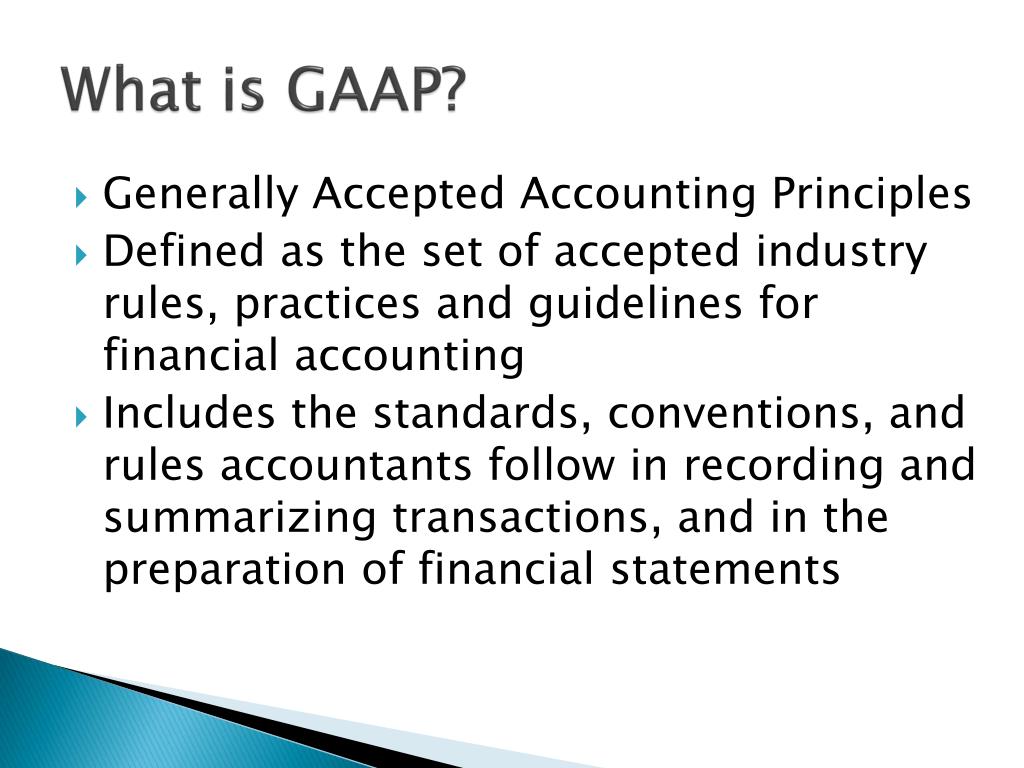
Only when liquidation is certain this assumption is not applicable. This validates the methods of asset capitalization, depreciation, and amortization.
Going Concern: assumes that the business will be in operation indefinitely. Revenue and expense should be kept separate from personal expenses. Accounting Entity: assumes that the business is separate from its owners or other businesses. To achieve basic objectives and implement fundamental qualities GAAP has four basic assumptions, four basic principles, and four basic constraints. helpful in improving the performance of the business. about economic resources, the claims to those resources, and the changes in them. helpful to present to potential investors and creditors and other users in assessing the amounts, timing, and uncertainty of prospective cash receipts. useful to present to potential investors and creditors and other users in making rational investment, credit, and other financial decisions. Basic objectivesįinancial reporting should provide information that is: GAAP and the international IFRS accounting systems, as the highest authority over International Financial Reporting Standards, the International Accounting Standards Board is becoming more important in the U.S. The SEC expressed their aim to fully adopt International Financial Reporting Standards in the U.S. As of 2010, the convergence project was underway with the FASB meeting routinely with the IASB. to abandon Generally Accepted Accounting Principles in the future (to be determined in 2011), and to join more than 100 countries around the world instead in using the London-based International Financial Reporting Standards. In 2008, the Securities and Exchange Commission issued a preliminary "roadmap" that may lead the U.S. Other organizations involved in determining United States accounting standards include the Governmental Accounting Standards Board (GASB), formed in 1984, and the Public Company Accounting Oversight Board (PCAOB).Ĭirca 2008, the FASB issued the FASB Accounting Standards Codification, which reorganized the thousands of US GAAP pronouncements into roughly 90 accounting topics In 1973, the Accounting Principles Board was replaced by the Financial Accounting Standards Board (FASB) under the supervision of the Financial Accounting Foundation with the Financial Accounting Standards Advisory Council serving to advise and provide input on the accounting standards. The AICPA first created the Committee on Accounting Procedure in 1939, and replaced that with the Accounting Principles Board in 1951. Īccounting standards have historically been set by the American Institute of Certified Public Accountants (AICPA) subject to Securities and Exchange Commission regulations.  7 Codification in Accounting - FASB Accounting Standards Codification TMĪuditors took the leading role in developing GAAP for business enterprises. 6 Precedence of GAAP-setting authorities. The FASB expressed US GAAP in XBRL beginning in 2008. companies to drop GAAP by 2016, with the largest companies switching to IFRS as early as 2009. The US GAAP provisions differ somewhat from International Financial Reporting Standards (IFRS), though former SEC Chairman Christopher Cox set out a timetable for all U.S. Financial reporting in federal government entities is regulated by the Federal Accounting Standards Advisory Board (FASAB).
7 Codification in Accounting - FASB Accounting Standards Codification TMĪuditors took the leading role in developing GAAP for business enterprises. 6 Precedence of GAAP-setting authorities. The FASB expressed US GAAP in XBRL beginning in 2008. companies to drop GAAP by 2016, with the largest companies switching to IFRS as early as 2009. The US GAAP provisions differ somewhat from International Financial Reporting Standards (IFRS), though former SEC Chairman Christopher Cox set out a timetable for all U.S. Financial reporting in federal government entities is regulated by the Federal Accounting Standards Advisory Board (FASAB). 
For local and state governments, GAAP is determined by the Governmental Accounting Standards Board (GASB), which operates under a set of assumptions, principles, and constraints, different from those of standard private-sector GAAP. Currently, the Financial Accounting Standards Board (FASB) is the highest authority in establishing generally accepted accounting principles for public and private companies, as well as non-profit entities.

Securities and Exchange Commission (SEC) requires that it be followed in financial reporting by publicly traded companies. US GAAP is not written in law, although the U.S. Similar to many other countries practicing under the common law system, the United States government does not directly set accounting standards, in the belief that the private sector has better knowledge and resources. Outside the academic context, GAAP means US GAAP. However, in the theoretical sense, Generally Accepted Accounting Principles encompass the entire industry of accounting, and not only the United States. The term is usually confined to the United States hence it is commonly abbreviated as US GAAP or simply GAAP. In the U.S., Generally Accepted Accounting Principles are accounting rules used to prepare, present, and report financial statements for a wide variety of entities, including publicly traded and privately held companies, non-profit organizations, and governments. Constant item purchasing power accounting.

It has been suggested that Generally Accepted Accounting Principles#US GAAP be merged into this article or section.








 0 kommentar(er)
0 kommentar(er)
